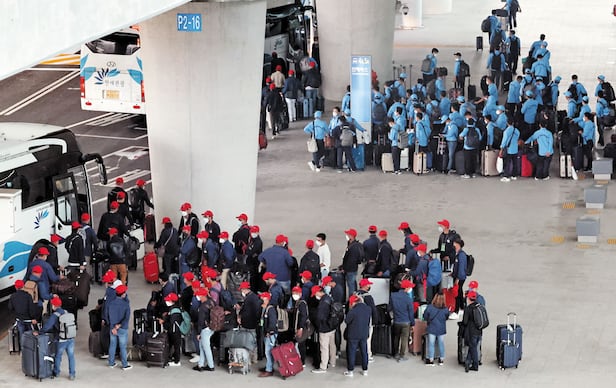Foreign Skilled Workers to Receive Long-Term Visa Transition After Two Years

Foreign nationals residing in South Korea who have demonstrated their skills will soon be able to transition to a long-term visa after a two-year grace period. Additionally, the number of skilled foreign workers that construction companies can hire will also increase.
On September 27, the Ministry of Justice announced that, as a follow-up to the new immigration policy introduced on September 26, the special provisions for skilled foreign workers (E-7-4) will be temporarily implemented until the end of 2026. The criteria for calculating the allowable number of skilled workers in the construction industry will also be revised.
Foreigners who have worked in South Korea for over five years under non-professional employment (E-9), maritime employment (E-10), or visiting employment (H-2) visas can change to the E-7-4 visa if they meet the qualifications in terms of skill level. They will need to complete the second stage of the social integration program, which includes basic Korean language and cultural education. However, there have been concerns that work hours make it difficult to fulfill this requirement.
In response, the Ministry of Justice has decided to temporarily relax the language requirement, allowing skilled workers to transition if they meet the Korean language criteria within two years. However, family reunification will still require meeting the language requirement, and skilled workers who do not meet the language criteria will only be allowed to stay for an additional six months.
Furthermore, the Ministry will increase the number of skilled foreign workers that construction companies can hire. Currently, companies can employ 0.1 workers for every 100 million KRW in average annual construction costs, and this will now be supplemented by a new standard allowing 0.4 workers for every 100 million KRW based on construction capability assessments. These assessments, conducted by the Ministry of Land, Infrastructure and Transport, evaluate a construction company's performance, financial status, technical capabilities, and external credibility, and are published annually at the end of July.
To support the acquisition of skilled workers in non-metropolitan areas, the Ministry will reduce the residency requirement for transitioning to skilled worker status from four years to three years if recommended by the heads of local governments in these areas.
Additionally, the Ministry of Justice will introduce a 'Visa and Residency Policy Proposal System' to systematically review suggestions from the economic and industrial sectors. Under this system, proposals from the private sector will be evaluated by the relevant government departments, and decisions on policy improvements will be made in consultation with private experts. When considering changes to the system, factors such as economic impact, employment effects, potential human rights violations, risks of illegal residency, fiscal soundness, and social integration will be comprehensively assessed. A pilot operation of the consultation council will begin this month, with full implementation expected next year.
What do you think?
0 reactions





